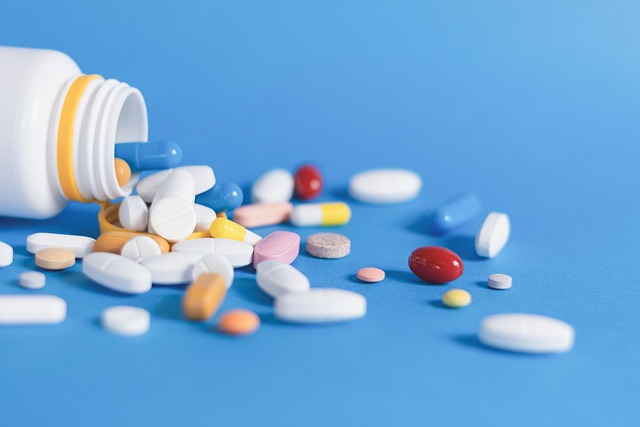GLP-1 drugs, mimicking natural hormone GLP-1, offer a multifaceted benefit in managing type 2 diabetes and cardiovascular health. They regulate blood sugar levels, reduce appetite for weight management, decrease major adverse cardiovascular events (MACE), lower blood pressure, improve cholesterol profiles, and promote heart protection. These drugs are well-tolerated but may cause gastrointestinal side effects; regular monitoring is essential. Clinical trials and real-world evidence consistently demonstrate their effectiveness in reducing cardiovascular risks, making them a valuable component of standard care. Ongoing research explores personalized medicine approaches to enhance GLP-1 therapy efficacy and mitigate adverse effects for improved patient outcomes.
GLP-1 agonists, a groundbreaking class of medications, have emerged as key players in maintaining cardiovascular health. These substances mimic the effects of the body’s natural hormone, GLP-1, which regulates blood sugar levels and promotes satiety. Beyond glycemic control, research reveals their remarkable ability to lower blood pressure, reduce cholesterol, and manage weight—all vital aspects of cardiovascular wellness. This article explores the multifaceted role of GLP-1 drugs in treating metabolic disorders and their potential as a game-changer in heart health.
Understanding GLP-1 Agonists and Their Function in the Body

GLP-1 agonists are a class of drugs that mimic the natural hormone glucagon-like peptide-1 (GLP-1) in the body. This hormone plays a crucial role in regulating blood sugar levels and promoting feelings of fullness after meals, which can help reduce appetite and support weight management. By activating GLP-1 receptors, these agonists stimulate insulin secretion when blood glucose is high, while also suppressing glucagon release, leading to decreased liver glucose production.
In the context of cardiovascular health, GLP-1 drugs have shown promising results. They have been found to reduce major adverse cardiovascular events in people with type 2 diabetes and established cardiovascular disease. Additionally, some studies suggest that GLP-1 agonists may have a protective effect on the heart by improving blood pressure, reducing inflammation, and promoting the growth of new blood vessels, all of which contribute to overall cardiovascular well-being.
The Impact of GLP-1 Drugs on Blood Sugar Regulation

GLP-1 drugs play a pivotal role in blood sugar regulation, mimicking the effects of the natural hormone glucagon-like peptide-1 (GLP-1). These medications stimulate insulin secretion in a glucose-dependent manner, promoting insulin release only when blood glucose levels are high. This targeted approach helps to lower blood sugar efficiently while minimizing the risk of hypoglycemia, a common concern with traditional insulin therapy.
By enhancing insulin’s action, GLP-1 drugs improve overall glycemic control, making them valuable in the management of type 2 diabetes. Their ability to suppress glucagon secretion also contributes to reducing blood glucose levels by preventing excessive liver glucose production. This dual mechanism of action makes GLP-1 drugs a versatile and effective tool in maintaining cardiovascular health, as well as managing blood sugar.
Cardiovascular Benefits: Lowering Blood Pressure and Cholesterol

GLP-1 agonists, a class of drugs that mimic the effects of the natural hormone glucagon-like peptide-1, have been found to offer significant cardiovascular benefits. One of their key roles is in lowering blood pressure, which is a crucial factor in reducing the risk of heart disease and stroke. By stimulating certain receptors in the body, these agonists can cause vasodilation—the widening of blood vessels—which leads to decreased blood pressure. This effect is particularly beneficial for individuals with hypertension or those at risk of cardiovascular events.
Additionally, GLP-1 drugs have been shown to reduce levels of LDL (bad) cholesterol and triglycerides in the bloodstream while increasing HDL (good) cholesterol. This dual action helps prevent the buildup of plaque in arteries, a process known as atherosclerosis, which is a major contributor to cardiovascular diseases. As such, the incorporation of GLP-1 agonists into treatment plans for patients with heart conditions or those at high risk can be a valuable strategy in maintaining and improving overall cardiovascular health.
Role in Weight Management and Obesity Prevention

GLP-1 agonists, a class of drugs that mimic the effects of the gut hormone GLP-1, play a significant role in weight management and obesity prevention. By enhancing insulin secretion and suppressing glucagon release, these drugs help regulate blood sugar levels, making them valuable for treating type 2 diabetes. Beyond their diabetic benefits, GLP-1 agonists have been shown to promote satiety, leading to reduced food intake and subsequent weight loss. This effect is particularly beneficial in the context of obesity, a significant risk factor for cardiovascular disease.
The mechanisms behind GLP-1 drugs’ impact on weight involve complex interactions with the brain’s hunger centers and gut hormones. They reduce appetite by slowing gastric emptying, providing a longer feeling of fullness after meals. As a result, individuals taking these medications often experience decreased calorie intake, contributing to healthy weight loss and potentially reducing the burden of obesity-related cardiovascular risks.
Safety and Side Effects Considerations

GLP-1 agonists, a class of drugs that mimic the effects of the gut hormone glucagon-like peptide-1, have shown promising results in improving cardiovascular health. However, as with any medication, safety and side effect considerations are paramount. These drugs primarily act by stimulating insulin secretion in a glucose-dependent manner, reducing blood sugar levels, and slowing gastric emptying, which can aid in weight management. While generally well-tolerated, GLP-1 drugs may cause gastrointestinal side effects such as nausea, vomiting, or diarrhea, particularly during the initial stages of treatment. Other potential adverse events include pancreatitis, kidney problems, and allergic reactions. Regular monitoring of patients’ blood sugar levels, kidney function, and overall well-being is essential to ensure safe use and mitigate these risks.
Clinical Trials and Real-World Evidence

Clinical trials have played a pivotal role in establishing the therapeutic potential of GLP-1 agonists in cardiovascular health. These studies have demonstrated significant benefits, such as reduced major adverse cardiovascular events (MACE) and decreased mortality rates among patients with type 2 diabetes and cardiovascular risk factors. Real-world evidence further reinforces these findings by showcasing the consistent efficacy and safety of GLP-1 drugs when used outside clinical trial settings. Large-scale observational studies have revealed that GLP-1 agonists can lead to meaningful improvements in cardiovascular outcomes, including reduced blood pressure, improved lipid profiles, and better glycemic control in diverse patient populations. This body of evidence has not only solidified the role of GLP-1 drugs in preventing cardiovascular diseases but also emphasized their potential as a valuable addition to standard care for at-risk individuals.
Future Prospects and Personalized Medicine Approaches

The future of GLP-1 agonists in cardiovascular health looks promising, with ongoing research exploring their potential role in preventing and managing various heart conditions. Personalized medicine approaches are gaining traction, aiming to tailor treatments based on individual patient characteristics and genetic profiles. This involves precise dosing regimens and the development of new GLP-1 drug formulations designed to improve efficacy and reduce adverse effects. By leveraging advancements in technology and a deeper understanding of pathophysiology, healthcare professionals can optimize GLP-1 therapy for each patient, enhancing cardiovascular outcomes and overall quality of life.
